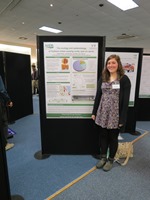News
See below for the latest news from the Warwick Crop Centre.
For our latest publications see Crop Centre in Print
Dave Chandler speaking at Oxford Real Farming Conference on 6th January
Dave Chandler is taking part in a debate about biopesticides in a session entitled 'Biopesticides under the microscope' at the Oxford Real Farming Conference on 6th January. Programme.
MSc agronomy students win Syngenta fungicide challenge
The 2014/15 MSc Sustainable Crop production students won the Warwick area Syngenta fungicide challenge. The challenge involves taking on groups of local farmers and agronomists to plan the most cost effective fungicide programme for winter wheat. The plan devised by the Warwick students returned a winter wheat yield of 13.4 t/ha. Harry Tricklebank collected the cup on behalf of the year cohort.
Best student poster awards for PhD student Kathryn Hales
 School of Life Sciences PhD student Kathryn Hayles, won both the John Colhoun Prize awarded for best student poster at the British Society for Plant Pathology Presidential Meeting 2015, and the best student poster award at the recent AHDB Studentship Conference, with her poster entitled 'Understanding the ecology and epidemiology of Pythium violae to enable disease management in carrot crops'.
School of Life Sciences PhD student Kathryn Hayles, won both the John Colhoun Prize awarded for best student poster at the British Society for Plant Pathology Presidential Meeting 2015, and the best student poster award at the recent AHDB Studentship Conference, with her poster entitled 'Understanding the ecology and epidemiology of Pythium violae to enable disease management in carrot crops'.
Plant science collaboration with Brazil to improve vegetable crops
Plant science collaboration with Brazil to improve vegetable crops
 Dr John Walsh
Dr John Walsh
 , Associate Professor in the School of Life Sciences, and his collaborators have been awarded £15,000 for a research project on the characterisation of Potyviruses infecting vegetable crops in Brazil. The project was funded through the FAPESP SPRINT
, Associate Professor in the School of Life Sciences, and his collaborators have been awarded £15,000 for a research project on the characterisation of Potyviruses infecting vegetable crops in Brazil. The project was funded through the FAPESP SPRINT
 scheme (São Paulo Researchers in International Collaboration), which aims to encourage and promote the advancement of scientific research through partnerships between researchers in São Paulo State and overseas. The University of Warwick is one of only five UK institutions that has partnered with the São Paulo Research Foundation (FAPESP) to support this scheme.
scheme (São Paulo Researchers in International Collaboration), which aims to encourage and promote the advancement of scientific research through partnerships between researchers in São Paulo State and overseas. The University of Warwick is one of only five UK institutions that has partnered with the São Paulo Research Foundation (FAPESP) to support this scheme.
Dr Walsh’s project will be carried out in collaboration with Prof Elliot Kitajima from the University of São Paulo’s Department of Plant Pathology and Nematology in Piracicaba and Dr Marcelo Eiras from the Instituto Biologico in São Paulo. Initial activities to develop this partnership were supported by the University of Warwick’s Brazil Partnership Fund in 2014. The Brazilian operation of the commercial seed company Sakata are also involved in the research programme.
Potyviruses cause significant losses in agricultural, pastoral, horticultural and ornamental crops. This project focusses on Turnip mosaic virus (TuMV), which causes diseases in the economically important brassica family of crops including broccoli, cauliflower, cabbage, turnip and oilseed rape. Through determining the diversity of TuMV and investigating broad-spectrum resistance to the virus the team is expecting to identify naturally occurring resistance genes which can then be introduced into commercial crop lines. The collaboration brings together complementary expertise in plant science research which will lead to significant synergies and knowledge exchange, but also has the potential to generate substantial societal and economic benefits through collaboration with industry and the resulting exploitation of intellectual property.
